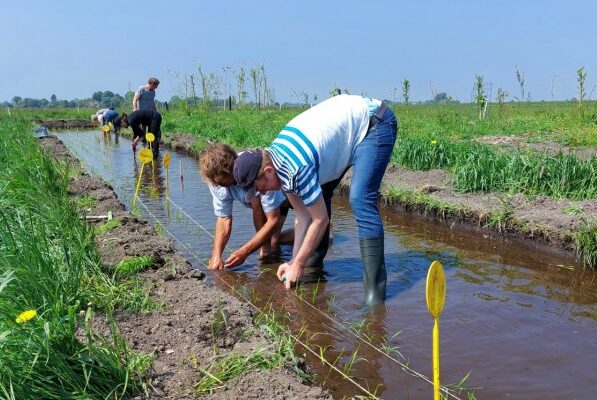First Dutch rice crop is a damp squib but hopes are still high

Dutch risotto will not be appearing on the menu just yet, as an experiment to grow rice in the Netherlands has failed to get off the ground – so far.
The combined effort by researchers from Leiden and Wageningen universities was aimed at finding out if growing rice can be a sustainable alternative for dairy farms on peat-meadow land.
Dairy farming requires the lowering of the groundwater level which causes the soil to subside, releasing large amounts of CO2. Researchers wanted to see if growing rice would reverse the process and increase biodiversity at the same time.
The Dutch paddy field, in Oude Ade near Leiden, yielded nothing like the 75 kilos of rice researchers had hoped for.
“Things were going great the whole summer long,” farmer Sander Roeleveld who dug out a patch of land to plant the rice, told broadcaster NOS .
“But then the flowers didn’t open at the right moment and the fertilisation process didn’t happen and we were left with hardly any grain at all.” Roeleveld said a cold spell at the end of July may have been the cause.
The researchers said that instead of Italian risotto rice, other varieties may yield better results. “Failed experiments are also useful. We are now looking into using varieties from Korea or the north of Japan, where they also have cold spells and comparable daylight hours,” Wageningen researcher Tom Schut said.
The KNMI’s latest climate forecast for the Netherlands includes wetter winters and dryer summers, which would make rice a viable crop, Schut said. “It would make water storage in winter possible while the heat would promote growth.”
If successful, growing rice can also help limit climate change. “In peat-meadow soil subsidence happens at the rate of two to three centimetres a year. One millimetre alone produces an amount of CO2 equal to that of an average car in a whole year. By making the polder wetter, you create storage for greenhouse gases. We are looking for crops that would benefit from that,” Schut said.
The experiments will continue next year, farmer Roeleveld said. “We are scaling up, with four types of risotto and rice for the whole village!”, he said.
Dutch scientists and farmers have also been trying to grow other exotic crops. Last year Dutch horticultural company Koppert Cress said it had succeeded in growing vanilla in greenhouses and is bringing it onto the market, targeting mainly the hospitality industry.
Thank you for donating to DutchNews.nl.
We could not provide the Dutch News service, and keep it free of charge, without the generous support of our readers. Your donations allow us to report on issues you tell us matter, and provide you with a summary of the most important Dutch news each day.
Make a donation